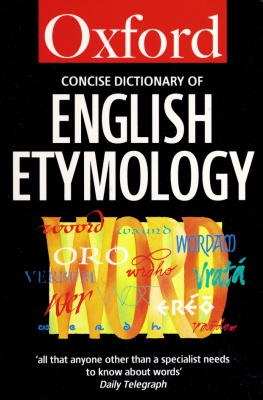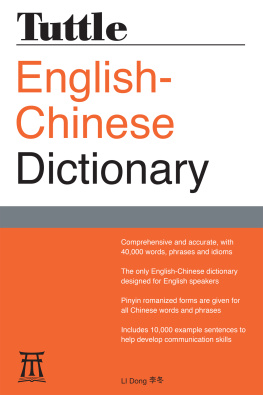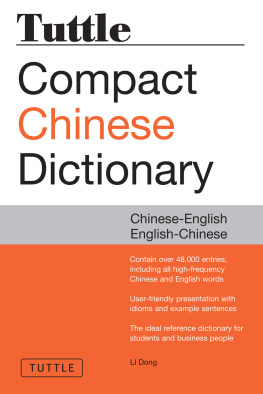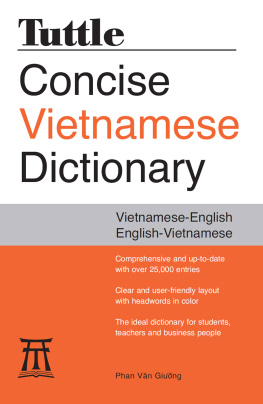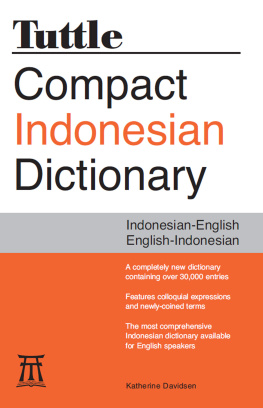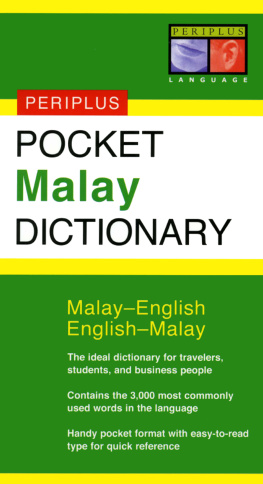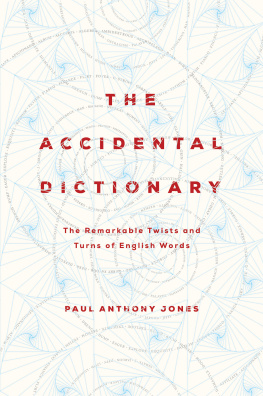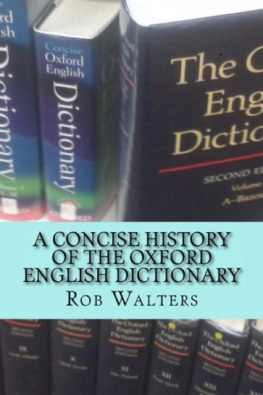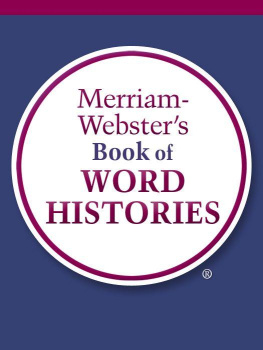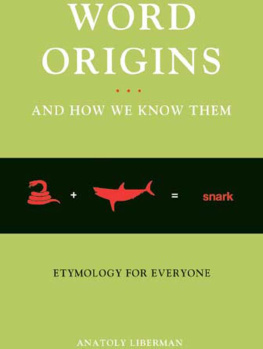
The concise Oxford dictionary of English etymology [electronic resource]
Hoad, T. F
Oxford University Press
This book was produced in EPUB format by the Internet Archive.
The book pages were scanned and converted to EPUB format automatically. This process relies on optical character recognition, and is somewhat susceptible to errors. The book may not offer the correct reading sequence, and there may be weird characters, non-words, and incorrect guesses at structure. Some page numbers and headers or footers may remain from the scanned page. The process which identifies images might have found stray marks on the page which are not actually images from the book. The hidden page numbering which may be available to your ereader corresponds to the numbered pages in the print edition, but is not an exact match; page numbers will increment at the same rate as the corresponding print edition, but we may have started numbering before the print book's visible page numbers. The Internet Archive is working to improve the scanning process and resulting books, but in the meantime, we hope that this book will be useful to you.
The Internet Archive was founded in 1996 to build an Internet library and to promote universal access to all knowledge. The Archive's purposes include offering permanent access for researchers, historians, scholars, people with disabilities, and the general public to historical collections that exist in digital format. The Internet Archive includes texts, audio, moving images, and software as well as archived web pages, and provides specialized services for information access for the blind and other persons with disabilities.
Created with abbyy2epub (v.1.6.9)
Oxford
CONCISE DICTIONARY OF
ENGL SH
'all that anyone other than a specialist needs
to know about words'
Daily Telegraph
Digitized by the Internet Archivein 2017 with funding fromKahle/Austin Foundation
https://archive.org/details/conciseoxforddicOOtfho
OXFORD PAPERBACK REFERENCE
The Concise Oxford Dictionary of
English Etymology
T. F. Hoad is Fellow and Tutor in English Language andMedieval Literature at St Peters College, Oxford, andLecturer in English at the University of Oxford. The workof compiling this dictionary was initially undertaken bythe late G. W. S. Friedrichsen and the book has the benefitof his many years experience of etymological work forthe Oxford dictionaries.
The most authoritative and up-to-date referencebooks for both students and the general reader.
Oxford
Paperback
Reference
AbbreviationsABC of MusicAccountingArchaeology*
ArchitectureArt and ArtistsArt TermsAstronomyBetter VVordpowerBibleBiologyBritish HistoryBuddhism*
BusinessCard GamesCeltic MythologyChemistryChristian ArtChristian ChurchClassical LiteratureColour MedicalComputingConcise QuotationsDanceDates
Dynasties of the World*
Earth Sciences
Ecology
Economics
Engineering*
English EtymologyEnglish FolkloreEnglish GrammarEnglish LanguageEnglish LiteratureEnglish Place-NamesEveryday GrammarFinance and BankingFirst NamesFood and NutritionForeign Words and PhrasesGeography
Handbook of the WorldHumorous QuotationsIdioms
Irish Literature
Jewish Religion
Kings and Queens of Britain
Law
LinguisticsLiterary QuotationsLiterary TermsLocal and Family HistoryLondon Place Names
MathematicsMedicalMedicinesModern Design*
Modern QuotationsModern SlangMusicNursingOperaPhilosophyPhysicsPlant-LorePlant SciencesPocket Fowlers ModernEnglish Usage*
Political Biography
Political Quotations
Politics
Popes
Proverbs
Psychology
Quotations
Reverse Dictionary
Sailing Terms
Saints
Science
Scientists
Shakespeare
Ships and the Sea
Slang
Sociology
Spelling
Statistics*
SuperstitionsSynonyms and AntonymsTheatre
Twentieth-Century ArtTwentieth-Century PoetryTwentieth-Century WorldHistoryWeather
Weights, Measures, andUnits*
Whos Who in the ClassicalWorld
Whos Who in the TwentiethCenturyWorld HistoryWorld MythologyWorld ReligionsWriters DictionaryZoology
*forthcoming
F. C. H.
AND
D. M. H.
Introduction
This dictionary is based upon the Oxford Dictionary of EnglishEtymology (1966), compiled by C. T. Onions with the assistance ofG. W. S. Friedrichsen and R. W. Burchfield. It was the late DrFriedrichsen who first produced a draft for a concise version of thatdictionary, and the present editor took over the work in 1977. Ingeneral, the book remains faithful to Dr Friedrichsens plan, althougha good many changes of detail and of a broader kind have been made,for which the present editor is alone accountable.
The intention is that each entry should give a concise statementof the route by which its headword entered the English language,together with, where appropriate, a brief account of its developmentin English.
In each case, the headword is followed by a figure in Romannumerals indicating the century in which the word is first recorded inEnglish, or if definitions are provided these are followed by figures inRoman numerals indicating the centuries in which the various sensesare first evidenced. In the case of words or senses recorded from theOld English period (c.7OO-c.llO0), however, these are labelled simplyOE. (or at most late OE.), since the nature of the surviving materialsusually makes any closer dating impracticable.
Definitions have not been provided for words whose senses haveundergone no major change in English, and whose meanings are likelyto be readily ascertainable by most readers. The same practice hasbeen adopted in the case of many technical and scientific words, whosesenses may be quickly discovered by recourse to a small English dictionary. No attempt has been made to record all the modern senses ofwords for which definitions are provided, since these are frequentlyof secondary importance in tracing the etymology and history of thewords in question.
A good many early spellings of words have been included, usuallyafter the relevant Roman numeral denoting the century of firstoccurrence. Such spellings have in particular been includedwhere they help to elucidate the origin and development of particularwords.
This dictionary distinguishes three principal kinds of process in theevolution of words:
(1) The normal development of a word within a given language,according to the regular processes of change in that language. Thus,English goose is explained as the normal development of the word*3ans- in the pre-literary Germanic language from which English is
descended, and Gmc. *3ans- is in turn the normal development of anearlier Indo-European *ghans-.
(2) The adoption of a word from one language into some other language. Thus, Eng. brave is explained as an adoption (borrowing) ofFrench brave, which in turn is an adoption of Italian bravo.
(3) The formation of a word on some existing word or element bymeans of a derivational device, or by compounding. Thus, Eng. alleviate is explained as having been formed on the past participial stem(allevidt-) of the late Latin verb allevidre, by means of the derivationalsuffix -ate, while allevidre is in turn formed on the Latin adjectivelevis by means of the derivational prefix al-. The Eng. compoundnightmare was formed by the combining of night and Middle Englishmare incubus.
The symbols used, for brevity, to denote these three processes arelisted below. It is, of course, not always possible to reduce the accountof the origins and development of words to a simple formula, andwhere necessary further explanation has been given.
Next page
